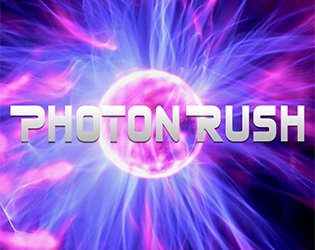Looking for a new monetization model
Photon Rush is our first game. It is not a large game, but its mechanic, designed to push the player out of it comfort zone, is quite tuned and is very fun. At least this is what we honestly think. We released the game on mobile and desktop platforms.
The game has been free since the beginning. We didn’t want to put ads in the game, since that would impact the experience in a negative way, and we didn’t want to spoil it. Photon Rush wouldn’t have given us much revenue through ads, anyway.
But, after the first year of the game, we decided to use Photon Rush as a test bed to try to figure out a revenue model more honest and cleaner than ads.
The gamer store option
We first retired the desktop version of the game from the web in order to try to put it in a game store. Very few people downloaded it from our web, so even a paid game on a store would have more players than a free game on our web. Being in a well know store also would increase the possibility of appearing in a bundle, and that would definitely push forward the number of players –not to say the revenues- so we decided that it was worth the try.
We were approved to appear at Desura. But then Desura apparently bankrupted, halting the process.
At that point, we had put the game with a price for the Windows Store, because it was incongruent to have to pay for the Desura’s win32 version of the game and not for the Windows Store version on Windows 8; they were basically the same. Since Photon Rush is a universal Windows 8 app, we put a price for the Windows Phone version too.
It was painful to see how, as a consequence of making the game not free, downloads halted in Windows platforms. We wanted some revenues from Photon Rush, but, above all, we wanted people to play Photon Rush!
A magical plot twist in the form of a promotion
The reason why we did not come back to the free model was that, during the process of price setting, we were contacted by myAppFree, an Italian company that each day promotes one paid app for free on Windows 8 and Windows Phone 8. MyAppFree is very popular among Windows Store and Windows Phone users.
We agreed with myAppFree to have Photon Rush featured on June 16th. It was great, in just one day, we had the same amount of downloads on the Windows platform than during all the app lifecycle in all platforms (Linux, Windows, Mac, Android, iOS, Windos Store and Windows Phone).
We were just lucky that myAppFree decided to promote our game. Photon Rush was promoted in the Windows Phone Store before, but those promotions were far less successful. After the promotion, we came back to the problem of making revenues out of Photon Rush without hurting the game or losing players. The desktop version issue was still unresolved, but we considered it dishonest to myAppFree to go back to the free model. However, the consequences of sticking with the paid model were clear: virtually zero downloads. We then decided to go something like coffee ware.

Pay when (and if) you want
In this modality, the game has a price, but you can enjoy the whole game for free. From time to time, the game ask you nicely and in no intrusive way to buy the game. It states clearly that the game will stay largely the same, and that you are paying as a way of saying thanks to the devs for the game. You even receive an achievement for that!
This model has several advantages:
- It allows playing and enjoying the game to people who has no payment options (generally people without access to a credit card, which is common in some countries, and to kids worldwide).
- There are people who, under no circumstances, would pay for a game in a mobile device. Well, they are not going to pay, anyway, but at least they can enjoy the game, and maybe show it to other people.
- There is no possibility whatsoever that a player feels disappointed with her purchase. She knows what she is buying.
- As we stated before, we wouldn’t make so much money with ads with this game. But I can’t help the feeling that ads is not a nice way to earn money with ads. You are giving something nice to users (the game), while at the same time you annoy them with the ads. You are selling your user attention to ads resellers. That does not feels like a conversation between the game designer and the players.
- Free to play model make the experience weird. Collecting and building is fun, but the cost balance in free to play games –if you don’t pay- is just not optimized for fun. Photon Rush is an aspirational game, so there is no place for that weirdness.
But, foremost, it give a feeling of purity to every penny you earn. I personally feel that the money we earned so far with Photon Rush as first money that I have really earned in my life. It’s like the player saying: Hey, here you go, grab my hard earned money. I prefer your game to that! Thanks!
Moreover, this is not just a normal goods exchange, because they already have the full game. Your players pay because they think they own it to you, or want to say thanks, or just want more of your work. And this is a very warming though.
The concept is very similar to donations, and its philosophy is very similar to that of Kickstarter or Patreon. This improves the feeling of a win-win situation, so the player will grow a bond feeling with the studio.
Technical details
The Windows Store and the Windows Phone Store have the option of downloading an app as trial. In the Windows Store, you can set up a time trial after which the app stops working (managed by the OS), or leave it timeless so the developer would implement a trial experience. In the Windows Phone store, you have only the last option. We have implemented a trial experience using the Unity 3D provided API facade, so when the user wants to buy the game, she will be redirected to the Windows Store, where she can buy the app.
Android and iOS do not have this trial experience, so we have implemented our model using an in app purchase. The process is quite more cumbersome, since there is more things to keep in mind. To simplify things, we have used an open source plugin called Soomla.
The in app purchase has one advantage over the trial approach: With the latter, every Photon Rush player who has downloaded the game before we changed the model owns the game, so they will never see the option to buy it. On the contrary, with the in app purchase approach, the whole user base will see the options once the app is updated to the new version.
Wrapping up
There are people buying the game (thanks many, people!). Not many, but they are. I am not sure yet whether this model will draw more money than ads, and how much, but I feel much more comfortable with it. I am going to use the same revenue model for the next small game I will produce.


So that’s the case? Quite a revelation that is.